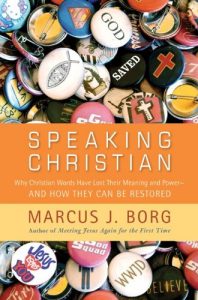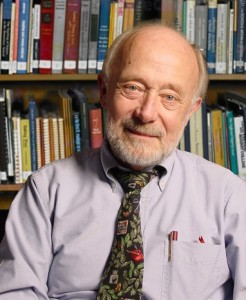Marcus Borg is Canon Theologian at Trinity Episcopal Cathedral in Portland, Oregon. He is also professor emeritus in the philosophy department at Oregon State University, where he was the Hundere Chair in Religion until his retirement in 2007. Borg is among the most widely known and influential voices in progressive Christianity. He is best known for his work as a fellow in the Jesus Seminar, his biblical scholarship, and as the author of twenty books. His most recent books are Speaking Christian: Why Christian Words Have Lost Their Meaning and Power — And How They Can Be Restored (2011) and Putting Away Childish Things: A Tale of Modern Faith (2010 — read my review here). For more information visit Borg’s website.
Book Basics
Being Christian involves knowing, using and being shaped by Christian language. Speaking Christian considers the current language concerns in a North American context while inviting readers to reconsider and even redeem the meaning of key words and phrases in the Christian vocabulary including born again, God, heaven, Jesus, mercy, rapture and second coming, righteousness and salvation. Borg argues that current misunderstandings of and shortcomings in Christian vocabulary are a result of the literalization of language during the modern era and the interpretation of Christian language within the context of what he terms “heaven and hell Christianity,” which is the popular framework that focuses on the afterlife, sin and forgiveness, Jesus’s dying for our sins, and believing (p.2, 10-14). Each word or phrase considered receives its own chapter (ranging from 4 to 20 pages), which considers its usage in the early church and development over the centuries.
In arguing for the restoration of earlier meanings of key words and phrases in the Christian language, Borg does not invite people to recreate an idealized version of the early church. Instead, he pictures a postmodern faith that is more closely aligned with the premodern than the modern, focused on this life rather than any life beyond this life, and communal rather than individualistic. Writing in a postmodern style, Borg shares both the views of others as well as his own experiences of and preference for certain perspectives.
recreate an idealized version of the early church. Instead, he pictures a postmodern faith that is more closely aligned with the premodern than the modern, focused on this life rather than any life beyond this life, and communal rather than individualistic. Writing in a postmodern style, Borg shares both the views of others as well as his own experiences of and preference for certain perspectives.
Speaking Christian is a must read for any progressive who is wondering if Christian language can be restored and/or who is seeking to better understand the historical richness of their Christian vocabulary.
So What?
Younger members of mainline congregations are increasingly ill at ease with certain Christian words. Borg rightly emphasizes that much of that discomfort, and even some quests to walk away from these words all together in favor of something else, comes as a result of an assumption that it is impossible or at least improbable to shift the meanings away from those crafted by the literalists.
- Do you view Christianity as being primarily concerned about this life or life beyond life (eternal life)? How does that answer inform how you read the Bible? Live out your faith?
- Are there any Christian words or phrases you have stopped using and think cannot realistically be reclaimed in ways that are meaningful? If so what do you place on that list? If not, what criteria would need to be met for you to feel this way about a given word or phrase?
- What types of faith formation groups or classes does your local congregation offer to help people explore religious language? What activities, readings, and/or people have influenced your current understanding of Christian language?
Marcus J. Borg. Speaking Christian: Why Christian Words Have Lost Their Meaning and Power –And How They Can Be Restored. HarperOne, 2011. ISBN: 9780061976551.
